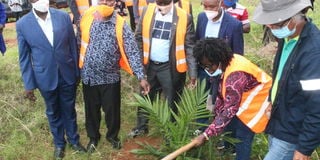Palm tree farmers earn Shs 5b

Connie Magomu Masaba (with a hoe) demonstrates how plant the oil palm tree. PHOTO/ Shabibah Nakirigya
What you need to know:
Palm trees have been grown in Uganda over several decades but with low yields. Efforts by researchers have enabled the improved varieties to overcome this setback.
Uganda’s nascent palm tree commercial growing has registered satisfactory results, posting over Shs5b in farmer incomes per month since its establishment in Kalangala District, Connie Magomu Masaba, the Project Manager of the National Oil Palm Project (NOPP) has revealed.
“We have more than 2,063 oil palm farmers in Kalangala, growing 4,848 hectares and earning more than Shs5b per a month as of July, 2021. There’s wide-ranging transformation of lives, across the board,” she said.
“These farmers share this money with the fisher folk, traders, teachers, and private developers or investors as part of this success story,” she added.
Out of the 2,063 farmers, the Shs5b is shared amongst 1,300 farmers with the harvestable crop.
This income has contributed to the development of Kalangala District. “They spend this money in shops and markets for domestic needs; in schools as fees; in pharmacies and clinics for medical care. They buy vehicles, motorcycles, new boat engines, they also purchase and develop land,” Masaba added.
Oil palm trees last at least 25 years before they are replaced and if properly looked after, farmers can harvest at least three times in a month. Oil palm fresh fruit bunches prices have risen from Shs216 per kilogramme in 2010 to Shs916 in July 2021.
“In one acre, a farmer earns up between Shs400,000 to Shs600,000 per a month when they do good agronomy, timely weeding, fertilisation and careful harvesting practices. This is a very lucrative commercial and economic enterprise. Uganda palm oil import needs are still so high that viability of this project is big and expansion is inevitable,” she added.
Success story
More than 16 years down the road, looking back Masaba also attributes success to firm and efficient introduction of the oil palms, whose income is more regular and higher than some of the traditional and non-traditional cash crops in Uganda.
This success story, she recalls, did not come easy, as there were lots of naysayers, skeptics, and outright anti-oil palm groups that opposed its introduction in Kalangala.
“They made lots of false claims both in Kalangala and outside. But our feasibility studies, plans and long-term vision were well-grounded. Education and sensitisation of leaders and the community led to a strategic step-by-step embracement of oil palm growing,” she explains.
“Farmers built steady trust and a rise in the adoption of oil palms. They have adhered to all the recommended good international practices of respecting the environment, while improving production and productivity,” Masaba explains.
Commercial oil palm growing in Kalangala started in 2006 with the first harvests made in 2010. With support from the National Oil Palm Project (NOPP) of the Ministry of Agriculture, Animal Industry and Fisheries (MAAIF) with funding from the International Fund for Agricultural Development (IFAD), farmers have been able to get themselves out of poverty.
“The biggest achievement for me besides building my house, rentals, and owning a shop has been the education of my seven children,” 45-year old Jane Nansamba of Bbeta village in Kalangala says. “My eldest child is at Muteesa I Royal University. I pay the tuition fees without any struggles,” she says. Nansamba owns two acres of mature oil palm trees. “I also suffer from goitre and treatment is expensive but with the monthly income from selling oil palm fruits, I am able to treat myself,” she says.
History
Commercial oil palm growing in Kalangala started in 2006 with the first harvests made in 2010. With support from the National Oil Palm Project (NOPP) of the Ministry of Agriculture, Animal Industry and Fisheries (MAAIF) with funding from the International Fund for Agricultural Development (IFAD), farmers have been able to get themselves out of poverty.





